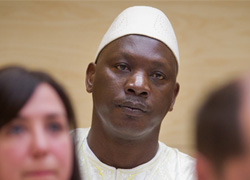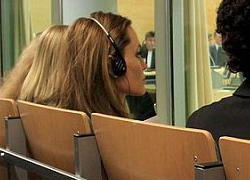In a landmark decision, on March 14, the International Criminal Court issued its first verdict and found Thomas Lubanga Dyilo guilty of enlisting and conscripting children under the age of 15 years to be soldiers and using them to participate actively in hostilities in the context of an internal armed conflict.
There are some critics of the decision itself, arguing that Lubanga was only a middle-level official in the Ugandan and Democratic Republic of the Congo (DRC) conflict itself and that the ICC Office of the Prosecutor failed to indict senior level-officials involved in the killing of a reported 50,000 Ugandan and Congolese civilians, as well as the enlistment and conscription of child soldiers. For the most part, however, the decision remains uncontroversial.
Below are a background of the conflict, a description of the counts against Lubanga, and an overview of the legal theory under which he was convicted.
Background of the Conflict

In September 2000, an inter-ethnic war began in the Ituri region of the DRC, with fighting and savage killings occurring between the Lendu and Hema tribes. This internal conflict consisted of a regular series of violent battles, largely between a Hema group, the UPC/FPLC (Union de Patriotes Congolais/ Forces Patrotiques pour la Libération de Congo), led by Thomas Lubanga, and other military or rebellion groups.
Uganda, with its army the UPDF (Uganda People’s Defense Force), was also involved in the armed conflict occurring in the DRC, both directly and indirectly. As early as September 15th, 2000, the Ugandans supplied support to the UPC/FPLC and other DRC armed groups, including the recruitment and training of soldiers, providing of weapons, and actual organization of several of the previously mentioned armed groups.
During these conflicts, children from villages throughout the DRC were conscripted and enlisted as soldiers for the UPDF and various rebel groups from villages, trained in the art of war, and directly used in the hostilities.
The Counts Against Lubanga
Thomas Lubanga Dyilo was charged with enlisting and conscripting of children under the age of 15 years into the Forces patriotiques pour la Libération du Congo [Patriotic Forces for the Liberation of Congo] (FPLC) and using them to participate actively in hostilities in the context of both an international armed conflict and a non-international armed conflict, between early September 2002 and June 2, 2003 (punishable under Article 8(2)(b)(xxvi) and Article 8(2)(e)(vii) of the Rome Statute).
Enlistment is the act of recruiting a child, under the age of 15, voluntarily into an armed force or group. A child’s consent during enlistment is not a valid defense. The Prosecution offered evidence that beginning at least as early as July 2000, the active recruitment of soldiers began, for purposes of officially creating the UPC, the armed branch of the FPLC. Many children joined the UPC/FPLC to earn money, seek revenge, protect themselves or their families, or because their parents offered them for enlistment upon request or demand from UPC/FPLC commanders.
Conscription is the act of forcibly recruiting a child, under the age of 15, into an armed force or group. During the conflicts in Uganda, children were forced into military service for the UPC/FPLC or threatened with force into joining. The Prosecution provided evidence that children were abducted or arrested by armed soldiers and brought to training camps. Once at the training camps, the recruits were threatened with beatings or death for not obeying orders or attempting to desert.
Co-Perpetration Overview
Co-perpetration is codified in Article 25(3)(a) of the Rome Statute and generally establishes that any individual responsible for making a contribution to the furtherance of a crime can be held vicariously responsible for the contributions of all others involved in the crime. In addition, the co-perpetrator may be considered a principle to the entire crime. Principals to a crime need not physically carry out an objective element of the offense, but rather can be found liable if they control or mastermind the commission. This type of liability is referred to as co-perpetration based on joint control.

In order to establish liability under a theory of co-perpetration based on joint control, it is necessary for the prosecution to prove certain objective and subjective elements essential to the claim. The objective elements of co-perpetration liability can be established by demonstrating 1) the existence of a common plan or agreement between two or more persons; and 2) that each co-perpetrator provided an essential contribution, resulting in the realization of the objective elements of the crime. The subjective elements may be proved by establishing that 1) the accused fulfilled the subjective elements of the crime in question; 2) the accused and his co-perpetrators were mutually aware and mutually accepted that implementing their common plan may result in the realization of the objective elements of the crime; and 3) the accused must be aware of the factual circumstances enabling him or her to jointly control the crime.
The Prosecution in the Lubanga case alleged that also involved in the common plan were Thomas Lubanga’s top commanders, Floribert Kisembo (FPLC Chief of Staff), Bosco Ntaganda (the FPLC Deputy Chief of Staff for Military Operations), Chief Kahwa, and commanders Tchaligonza, Bagonza, and Kasangaki. The Prosecution argued that these five individuals exercised joint control over the commission of the objective elements of the crimes. Evidence supporting a common plan or scheme was circumstantial but indicated a common plan based on the widespread nature of the activities, including: the widespread recruitment and conscription of child soldiers, numerous training camps for child soldiers, and evidence of families fleeing Uganda to avoid their children being abducted for conscription purposes.
Additionally, Thomas Lubanga did not attempt to hide the fact that he used child soldiers as personal bodyguards. Numerous witnesses testified during the trial that it was common knowledge in Ituri that Thomas Lubanga and his family used child soldiers as bodyguards. On several different occasions, Thomas Lubanga was witnessed attempting to recruit children from Hema villages by appealing to tribal elders.
The Chamber’s Decision
The Chamber concluded that the Prosecution had proven all of the elements of the Indictment crimes beyond a reasonable doubt. Interestingly, the Chamber did note that an international armed conflict had not been sufficiently established relating to the crime base and the UPC/FPLC’s involvement in the conflict, and accordingly, the Chamber convicted Lubanga solely on crimes perpetrated within the context of an internal armed conflict.
On interesting side note, American actress Angelina Jolie attended the public reading of the verdict today. She commented that, “The delivery of the ICC’s first verdict today is an important moment for the Court, for the Democratic Republic of Congo, and for the rule of law. Perhaps today’s verdict of guilty provides some measure of comfort for the victims of Mr Lubanga’s actions. Most of all it sends a strong message against the use of child soldiers.”


